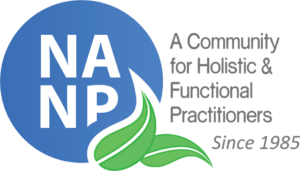by Lesley Herrmann, MSc, CNC, CWC, BCHN®️
The immune system is constantly using resources to regenerate and protect us from getting sick. Luckily, there are many ways to fight back against seasonal illness with supportive foods, key supplements, and rejuvenating lifestyle practices.
As nutritional professionals, we can help our community reduce stress and stay healthy by reminding our clients of the power we have at our fingertips to support our immune system. This article provides a list of immune-bossing foods, supplements, and self-care strategies we can all implement at home.
Add immune-enhancing foods to your diet.
Garlic is a potent anti-microbial, anti-viral super food! The sulfur-containing compounds in this allium vegetable have been shown to provide health benefits in a variety of body systems, including the immune system, digestive system, cardiovascular system, detox system, and endocrine system. It can also help reduce inflammation associated with illness.
Medicinal mushrooms such as rishi, shiitake, and turkey tail support the immune system by activating macrophage and killer-T cell activity (Hobbs, 1995).
Fermented foods like yogurt, kimchi, and sauerkraut are full of probiotics that support gut health and can therefore enhance immune function. Probiotics help defined the body from invaders by supporting the epithelial tissue in the intestines, which acts as a barrier against pathogenic microbes and other harmful substances (Myers, A, 2017).
Bone broth from grass-fed or pasture-raised organic sources is loaded with supportive minerals, proteins, and collagen. Bone broth has been shown to repair leaky gut, improve digestion, reduce inflammation, and help fight off infections (Myers, 2017), (Daly, 1990). You can find good, easy recipes over at the Weston A. Price Foundation website.
For plant-based alternatives, try adding seaweeds to your vegetable broth for added minerals and iodine, a key nutrient for thyroid function. Miso and mushrooms are also a great addition to vegetable broths. Mushrooms contain B-vitamins that support energy production at the cellular level and miso is another great fermented food that can support a healthy microbiome (Murry 2010).
Supplement with Key Nutrients.
Vitamin D: Low vitamin D levels are directly related to increased susceptibility to infection. Unfortunately, researchers estimate that over 40% of the US population is deficient in this nutrient (Forrest and Stuhldreher 2011). Vitamin D modulates the immune system and helps activate T cells, B cells, and antigen-presenting cells (Aranow 2011). Supplement with D3 (cholecalciferol) for best results.
Zinc: This mineral is found in many cells throughout the body and helps strengthens the immune system by supporting T-helper cells. It is important in the production of nuclear factor kappa B (NF-kB), an important immune regulator (Prassad 2008). Zinc also has antioxidant and anti-inflammatory properties. Try zinc picolinate for best absorption.
Vitamin C: Vitamin C is a strong antioxidant and supports the immune system by stimulating the production of many white blood cells as well as antibodies. It accumulates in phagocytic cells, like neutrophils, and can enhance phagocytosis, engulfing and breaking down foreign invaders. (Carr and Maggin 2017) Look for non-GMO varieties of vitamin C.
Magnesium: Magnesium is the fourth most abundant mineral in the body after calcium, potassium, and sodium, and is involved in over 600 enzymatic reactions. Magnesium supports the immune system by activating vitamin D and enabling a normal immune response after exposure to an antigen, such as a virus or bacteria. It also plays a critical role in DNA and RNA syntheses and cell repair (Uwitonz and Razzaque 2018). Try magnesium glycinate for optimum bioavailability and gentleness on the digestive system.
Vitamin A: Vitamin A plays an important role in supporting the immune system and healthy inflammatory processes. In order to defend the body from invading microbes, the immune system makes and releases antibodies that can block the activity of unwanted pathogens. Vitamin A helps regulate the rate of antibody action. T cells and B cells of the immune system require vitamin A for synthesis (WHF 2020). Look for a micellized formula that contains both vitamin A palmitate (or preformed vitamin A from animal sources) and beta-carotene (from plant sources) for best absorption and bioavailability. Because vitamin A is a fat-soluble vitamin, clients should be aware and cautious of dosage and duration of use. Unlike water-soluble vitamins, fat-soluble vitamins are stored in the body. Excess vitamin A is stored in the liver and can lead to liver damage if excessive consumption continues long-term (IM, 2001).
Show your body some love.
Get plenty of sleep: Sleeping conserves energy that our immune system then uses to fight off pathogens. Aim for 8-10 hours a night when fighting an infection.
Sweat it out: The use of dry saunas to rid the body of infectious disease has been used for centuries by cultures around the world, as raising the core body temperature and sweating can help keep pathogens at bay. Research has shown that sauna use can reduce the incidence of the common cold and possibly other viruses (Ernst et al, 1990). Those with heart conditions however should use caution with saunas. Contraindications to sauna bathing include unstable angina pectoris (chest pain), those who have recently had a heart attack, and severe aortic stenosis, a condition of the aortic valve (Hannuksela and Ellahham, 2001). It is also recommended to check with a physician before using a sauna while ill. Remember to hydrate before, during, and after use to preserve important electrolytes.
Get moving: Unlike the circulatory system, the lymph system doesn’t have a pump; the body depends on movement to circulate the lymph fluid. The lymph system and the circulatory system work together to keep us healthy. A gentle walk, chi gong, yoga, or even stretching can help clear the body of waste.
Don’t stress, find gratitude: Studies have shown that stress has a weakening effect on the immune system (McLeod, 2010). Stress, as well as fear, can then essentially give invading bacterial and viruses more power to make us sick. Instead, focus on the positives and acknowledge all you have to be grateful for.
There are many ways in which we can protect our health with whole foods, quality supplements, and simple lifestyle practices. As nutritional professionals, we can also help keep our community healthy by reminding our clients how important it is during this time to eat a clean diet and spend more time implementing self-care. These strategies can strengthen the immune system and help people stay active and healthy during this unusually long cold and flu season, and any time of year.
Sources
Forrest, K. and Stuhldreher, W. (2011). Prevalence and correlates of vitamin D deficiency in US adults. Nutrition Research. 2011 Jan; 31(1):48-54. Available at https://www.ncbi.nlm.nih.gov/pubmed/21310306
Aranow, C. (2011). Vitamin D and the Immune System. Journal of Investigative Medicine. 2011 Aug; 59(6): 881-886. Available at: https://www.ncbi.nlm.nih.gov/pmc/articles/PMC3166406/
Prassad, A. (2008). Zinc in Human Health: Effect of Zinc on Immune Cells. Molecular Medicine. 2008 May-June; 14(5-6): 353-357. Available at https://www.ncbi.nlm.nih.gov/pmc/articles/PMC2277319/
Carr, A. and Maggini, S. (2017). Vitamin C and Immune Function. Nutrients. 2017 Nov 3; 9(11). Available at https://www.ncbi.nlm.nih.gov/pubmed/29099763
Uwitonze, A. Razzaque, M. (2018). The Role of Magnesium in Vitamin D Activation and Function. The Journal of the American Osteopathic Association, March 2018, Vol. 118, 181-189. Available at: https://jaoa.org/article.aspx?articleid=2673882
WHF (2020). Vitamin A. Worlds Healthiest Foods, The George Mateljan Foundation. Available at http://www.whfoods.com/genpage.php?tname=nutrient&dbid=106.
Institute of Medicine (2001). Food and Nutrition Board. Dietary Reference Intakes for Vitamin A, Vitamin K, Arsenic, Boron, Chromium, Copper, Iodine, Iron, Manganese, Molybdenum, Nickel, Silicon, Vanadium, and Zinc. Washington, DC: National Academy Press; 2001.
Myers, A. (2017). The Autoimmune Solution: Prevent and Reverse the Full Spectrum of Inflammatory Symptoms and Diseases. HarperOne; 2017 May 2.
Daly, J. (1990) Effect of Dietary protein and amino acids on immune function. Critical Care Medicine. 1990 Feb: 18: S86-93. Available at https://www.ncbi.nlm.nih.gov/pubmed/2105184
Murry, M. (2010). Encyclopedia of Healing Foods. Atria Books. 2010 May 8.
Hobbs, C. PhD. (1995). Medicinal Mushrooms: An Exploration of Traditional Healing & Culture. Book Publishing Company, Summertown, TN. ISBN-13: 978-1884360015.
McLeod, S. (2010). Stress, Illness, and the Immune System. Simply Psychology. Available at https://www.simplypsychology.org/stress-immune.html.
Ernst, E. Pecho, E. Wirz, P. and Saradeth, T. (1990). Regular sauna bathing and the incidence of common colds. Annals of Medicine. 1990: 22(4):225-7. Available at https://www.ncbi.nlm.nih.gov/pubmed/2248758
Hannuksela, M. and Ellahham, S. (2001). Benefits and Risks of Sauna Bathing. American Journal of Medicine. 2001 Feb 1; 110(2):118-26. Available at https://www.ncbi.nlm.nih.gov/pubmed/11165553
Lesley Herrmann, MSc, CNC, CWC, BCHN®️
Lesley is Board Certified in Holistic Nutrition®️ by the NANP. She believes in the notion of ‘food as medicine” and uses whole-food based organic eating and mindfulness as the foundation for her practice. She specializes in supporting individuals working through chronic inflammatory response syndrome, or CIRS, a condition triggered by mold and other biotoxins. With a background in building science and a personal experience with toxic mold exposure, she addresses both the health of the home and the individual, providing support on a physical, emotional, and environmental level. She also focuses on stress management, gastrointestinal conditions, and food sensitivities. Lesley enjoys working one-on-one with individuals, leading small group workshops, and teaching in the community. Learn more at www.AwakenedTaste.com.



